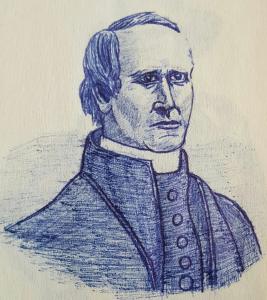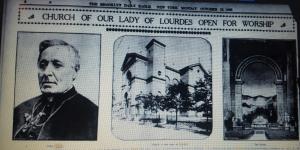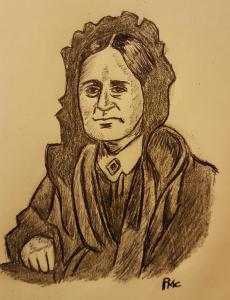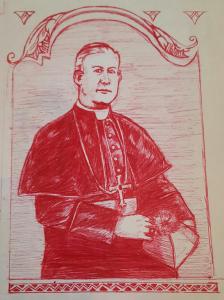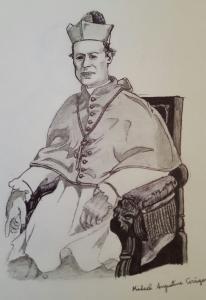On this day in three separate years, three significant figures in the early history of Catholic Brooklyn passed away:
- John Loughlin (1817-1891), founding bishop of the Brooklyn Diocese.
- James Alphonsus McMaster (1820-1886), editor of nineteenth century New York’s premier Catholic periodical, The Freeman’s Journal.
- Father Sylvester Malone (1821-1899), activist and pastor of a Brooklyn church for fifty-five years straight.
The three were widely different in temperament and outlook. While the fiery McMaster loved controversy, Bishop Loughlin assiduously avoided any public attention. (It was said that he had aversion to “two classes of people: reporters and Jesuits.”) When Father Malone came to Brooklyn as a young priest, he was subject to anti-Catholicism, but he became Brooklyn’s leading Catholic ecumenist.
While Malone and Loughlin were immigrants from Ireland, McMaster’s family had deep roots in America. Born in upstate New York, he converted to Catholicism as a young man and briefly studied for the priesthood before marrying and raising a family in Brooklyn. In 1848, he assumed editorship of an independent Catholic paper which he edited for thirty-eight years. He was a longtime parishioner of St. Patrick’s Church on Kent Avenue.
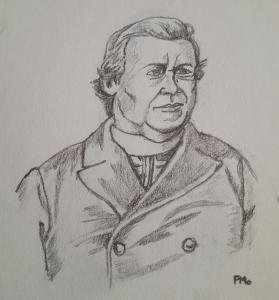
After his ordination in the summer of 1844, Father Malone received his first and only assignment, to found and serve Saints Peter and Paul Church in Brooklyn’s Williamsburg section. At the time, the neighborhood was a hotbed of anti-Catholicism, and the young priest was jeered on the street. As he built up the parish (and parochial school), he got involved in the local community, becoming a fixture of neighborhood life. By the end of his life, he was known to Jewish and Protestant Brooklynites as “our Father Malone.”
When John Loughlin came to Brooklyn in the Fall of 1853, he was only thirty-six years old, one of America’s youngest Catholic bishops. At the time, his diocese covered all Long Island, but there was only a handful of priests and religious, churches and schools there. By the time of his death thirty-eight years later, there existed a vast, rich, growing network of Catholic institutions covering the map of the island. But the bishop sought no publicity; in fact he assiduously avoided it.
When the Civil War erupted in April 1861, two of these three were on opposite sides of the political spectrum. While McMaster was anti-Lincoln and pro-Democrat (his paper would briefly be shut down during the war for this), Malone was one of the few priests to publicly espouse abolition. Bishop Loughlin supported the Union and the president quietly but firmly.
In the postwar years, Brooklyn grew by leaps and bounds. McMaster continued to chronicle this growth from his Manhattan office. As Brooklyn’s Jewish community expanded, Father Malone reached out to them, leading the Friendly Sons of St. Patrick to local Purim celebrations. Whereas anti-Catholicism had once dominated Brooklyn life, by the 1870’s one newspaper commented that it now “might well be called a Catholic city.” In his centennial diocesan history, Monsignor John K. Sharp comments of the bishop: “He built mightily– churches, schools, and institutions.”
Bishop Loughlin was unique among bishops in that he did most of his own work himself. The nameplate on his residence read simply “Rev. J. Loughlin.” He answered his own door, paid his own bills, and picked up his own mail. It was said that he “carried the chancery in his hatband.” Others suggested he was destined for St. Patrick’s Cathedral across the river, but Bishop Loughlin would have none of it. He was Brooklyn through and through.
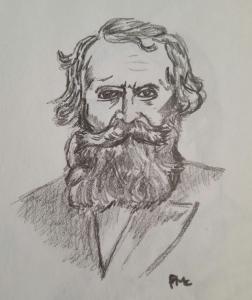
At the time of his death in 1886, McMaster was characterized as “ever intemperate.” Bishop Loughlin’s obituary noted simply that “he has seen much service,” which is probably the best assessment of his episcopate. Before his death in 1899, a Brooklyn Rabbi said of Father Malone, a longtime champion of progressive issues: “Would to heaven that all the faiths had men like you.” The Brooklyn Eagle eulogized him as a “everybody’s friend.”
It takes a lot of different people to build a Church. While McMaster’s conservatism bordered on the bigoted, Malone was a forward thinking progressive. Loughlin was a quiet, unobtrusive man who spent his life in administrative and pastoral service. Together they helped build up the Brooklyn Diocese, and their legacy survives to this day in the institutions they founded. McMaster’s legacy lives on in a special way. In 1907, his daughter Sarah brought the Carmelite Nuns to Brooklyn, where they remain today, praying for the local Church.

